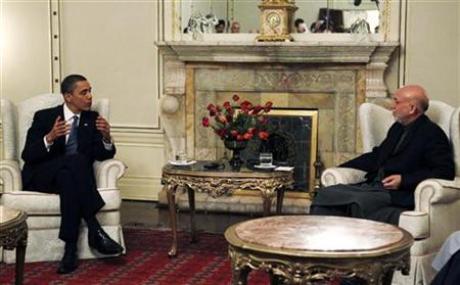The President Karzai-President Obama relationship was bound to be an uncomfortable one from the get-go, but things are getting ridiculous, and it is not helpful for either side. In case you haven’t heard, ever since Obama’s visit to Kabul last week, which included a personal meeting with Karzai, a diplomatic (more likely undiplomatic) row has occurred between the two sides, with Karzai accusing the West/US of illegally tampering with his reelection and even stating that he might have to join the Taliban if things did not improve between his government and the US. The Obama administration, which has kept Karzai at arms-length ever since it came into office, followed up its reported tough talk about Karzai’s corrupt practices during Obama’s Kabul trip with talk that the Afghan president may have his invitation to DC this May cancelled. Thankfully, in the past 24 hours relations seem to be on a more sure footing as the US State Department went out of their way to affirm that Karzai was a valuable partner and that “it’s important to try to tamp this down and get back to business.”

Notice the distance, both literally and figuratively…
It is important to remember the many audiences in play for each side here. President Karzai has a federal and local government to lead, a more than skeptical populace waiting to see results and be shown that he is not just a feckless American puppet, and various factions of insurgents, some of whom he will need to join his side if he is to bring about real national reconciliation. Then of course add to this an American government invested heavily, and I mean heeeeeavily!, in Afghanistan’s future, European donors and soldiers, the United Nations, and of course neighboring powers such as Pakistan, India, Iran, and Turkey (not to mention a little neighbor called Kyrgyzstan!). President Obama has his own cascade of audiences to please as well. That being said, both sides are stuck with each other and spats like this cannot be allowed to fester for long. In a Fred Kaplan article on the subject he quotes Gerard Russell, a former UN official who was based in Kabul, who argued that ‘the West is faced with just two options on what to do about Karzai: either withdraw support for him—or back him all the way. Ambivalent support or persistent bickering is a recipe for disaster and defeat.’
I’m basically in agreement with Russell’s black and white conclusion. In fact, one could argue that the Obama administration’s (with Karzai basically doing the same) public critiques of Karzai combined with a dearth of high level meetings has forced Karzai to outwardly fight back to maintain relevance and domestic legitimacy. Karzai was reportedly very angry at US National Security Advisor’s Jim Jones’s comments before the Obama visit that he had made ‘no progress’ on the corruption front. And it’s not like Karzai is holding a bad poker hand here, as it is in strong American interest for his government to be stable and prosperous. For this outcome to even possibly occur, it is near impossible to imagine Hamid Karzai not being an important aspect of it. After all, if a viable alternative was to be found in a legitimate fashion, the presidential election of 2009 was the venue.
It is understandable for both administrations to be frustrated with the other as the situation is untenable for both sides in many ways, but like Mr. Russell asserted, a falling out between the two would likely leave both parties in undesirable positions. Both sides need to walk fine lines here. The Obama administration needs to provide enough backing for Karzai so that he can have a chance at progressing the ability and legitimacy of the Afghanistan government, while at the same time making it clear to the Afghan president that we expect concrete results in exchange for all of the American political, financial and military resources that largely created and maintain his position. The Karzai administration needs to show….the Afghan population that it is independently capable of providing services and security to the whole country, portions of the Taliban insurgency that are willing to give up their weapons that it is a viable negotiating partner, and the US/NATO that it can be a dependable partner.
(Photo Source: Reuters)